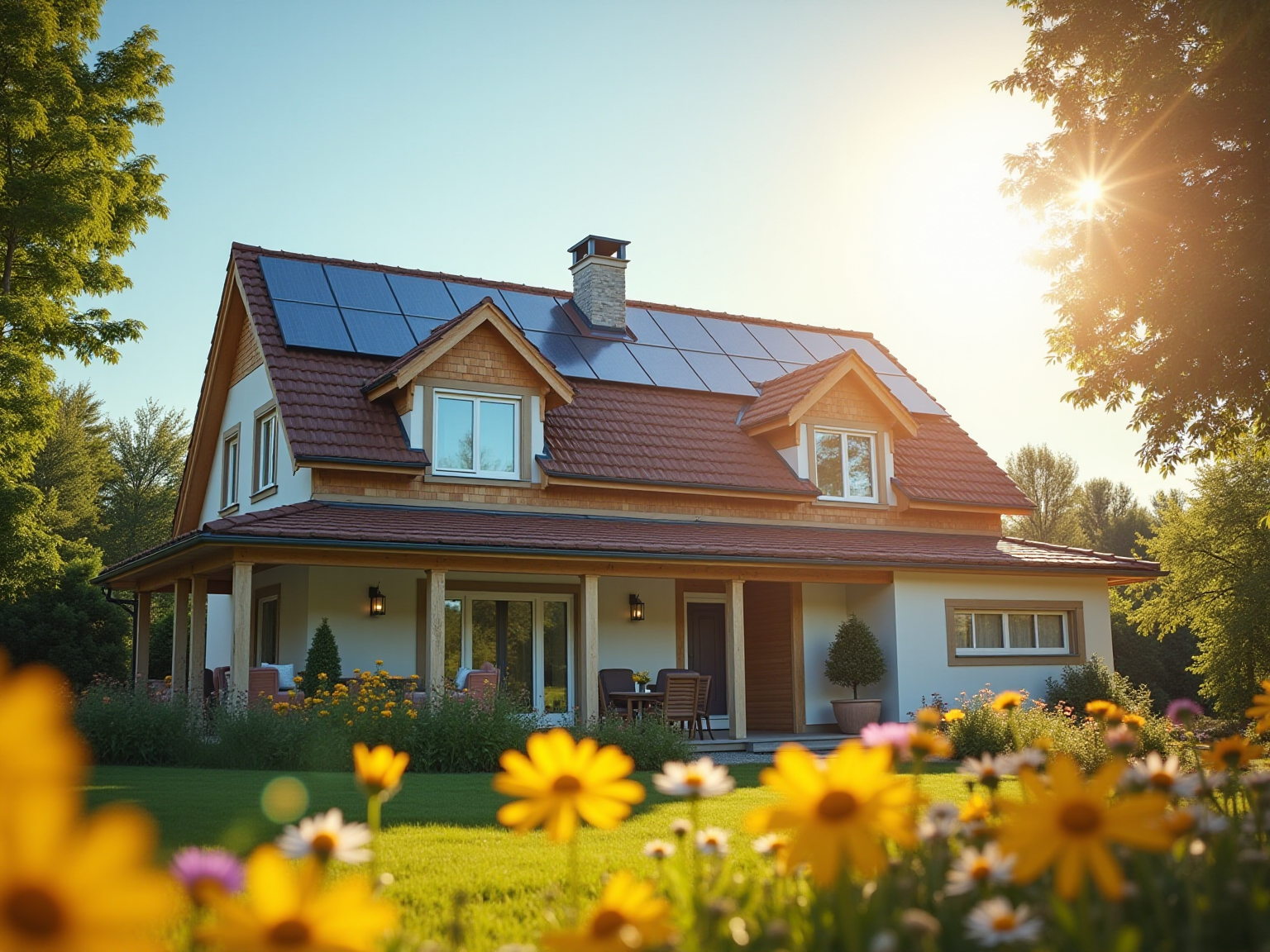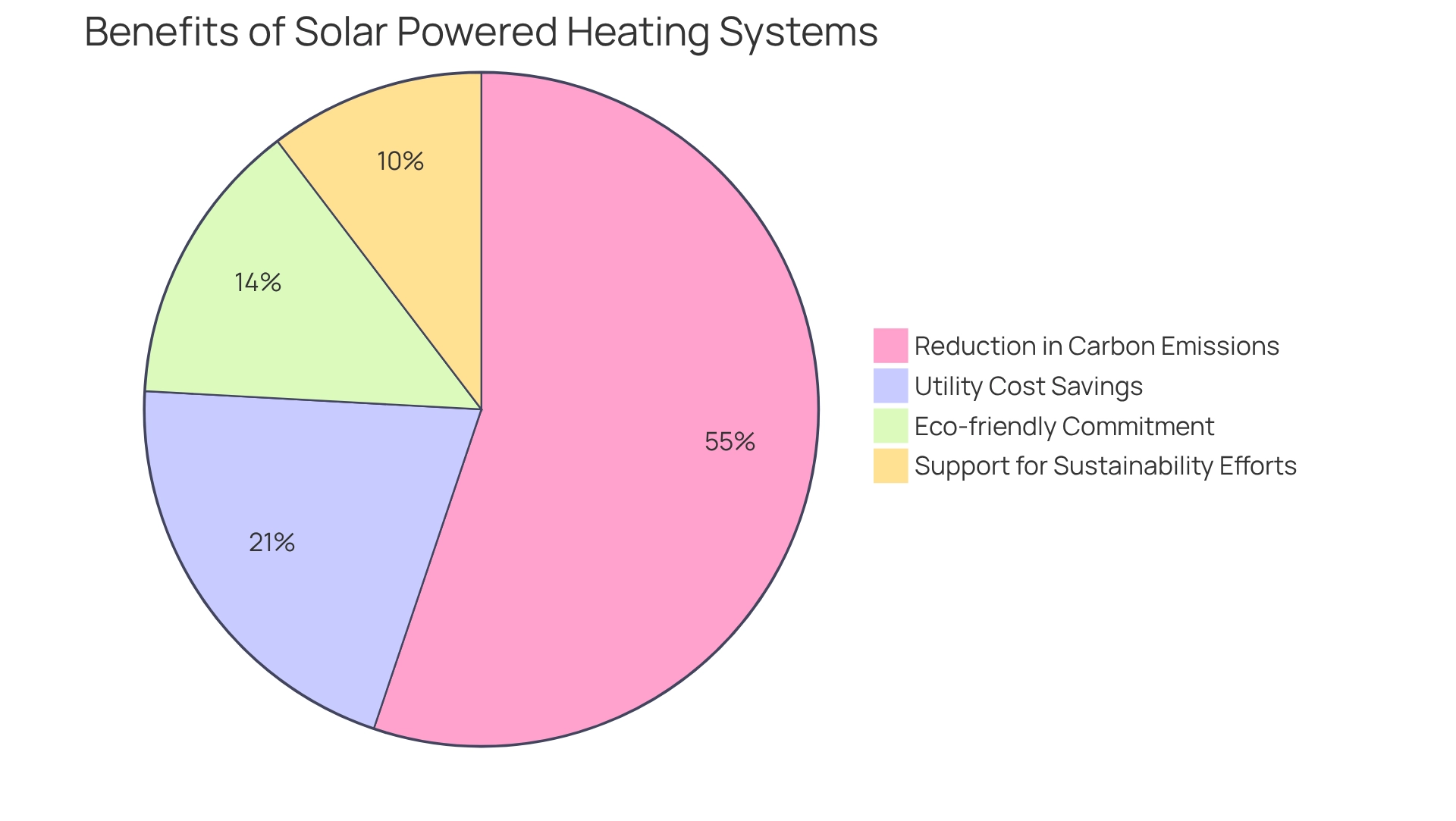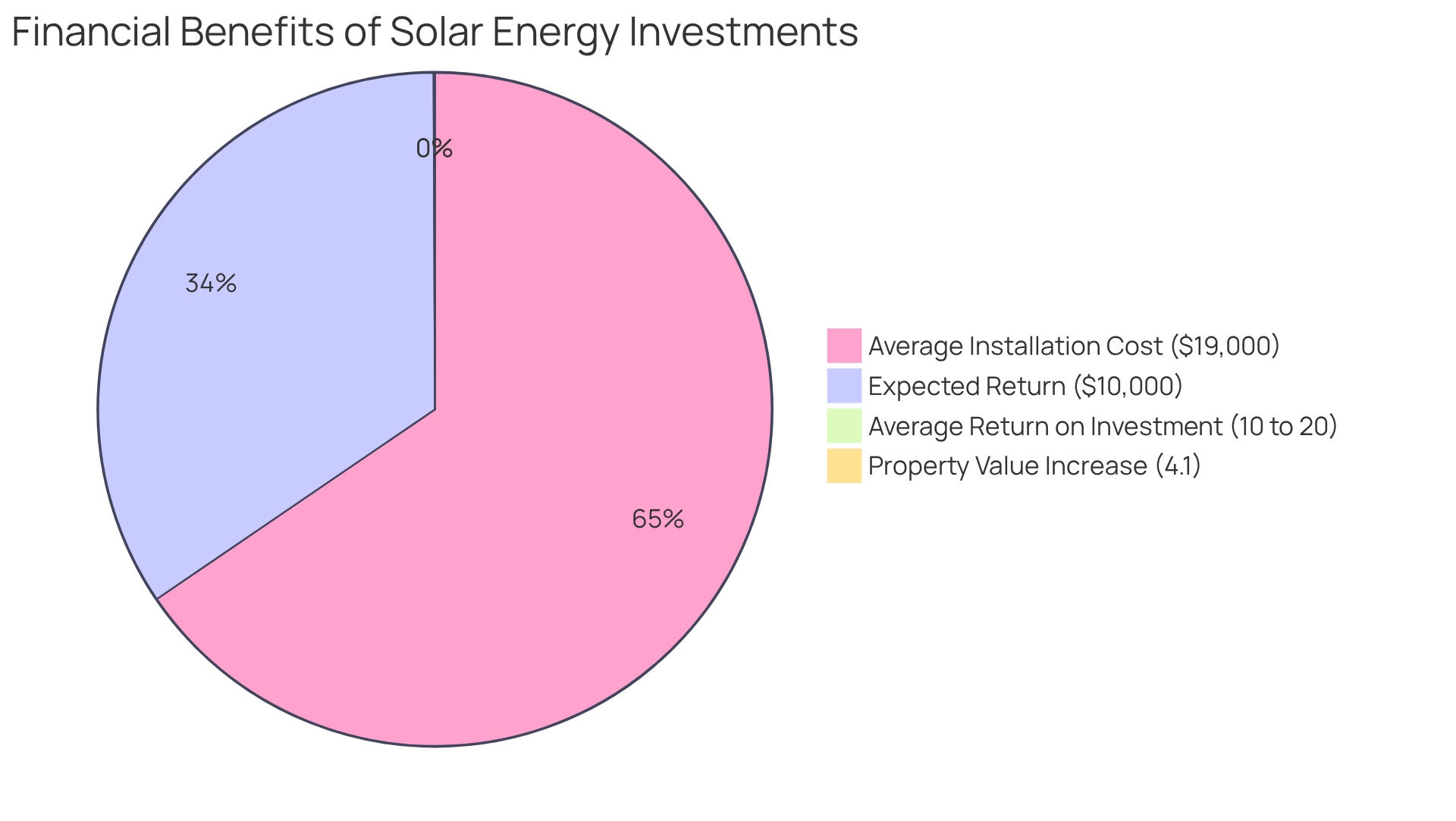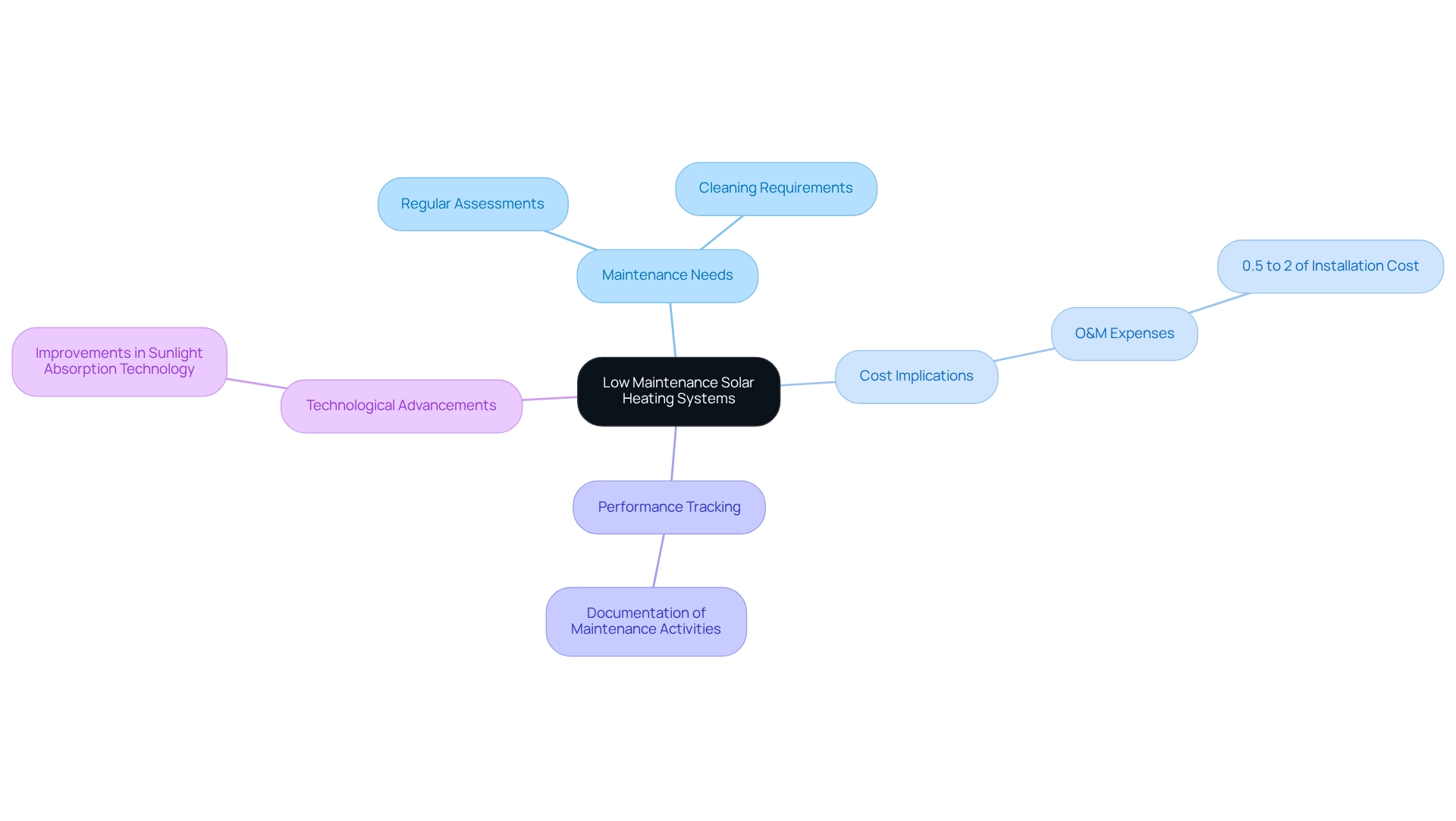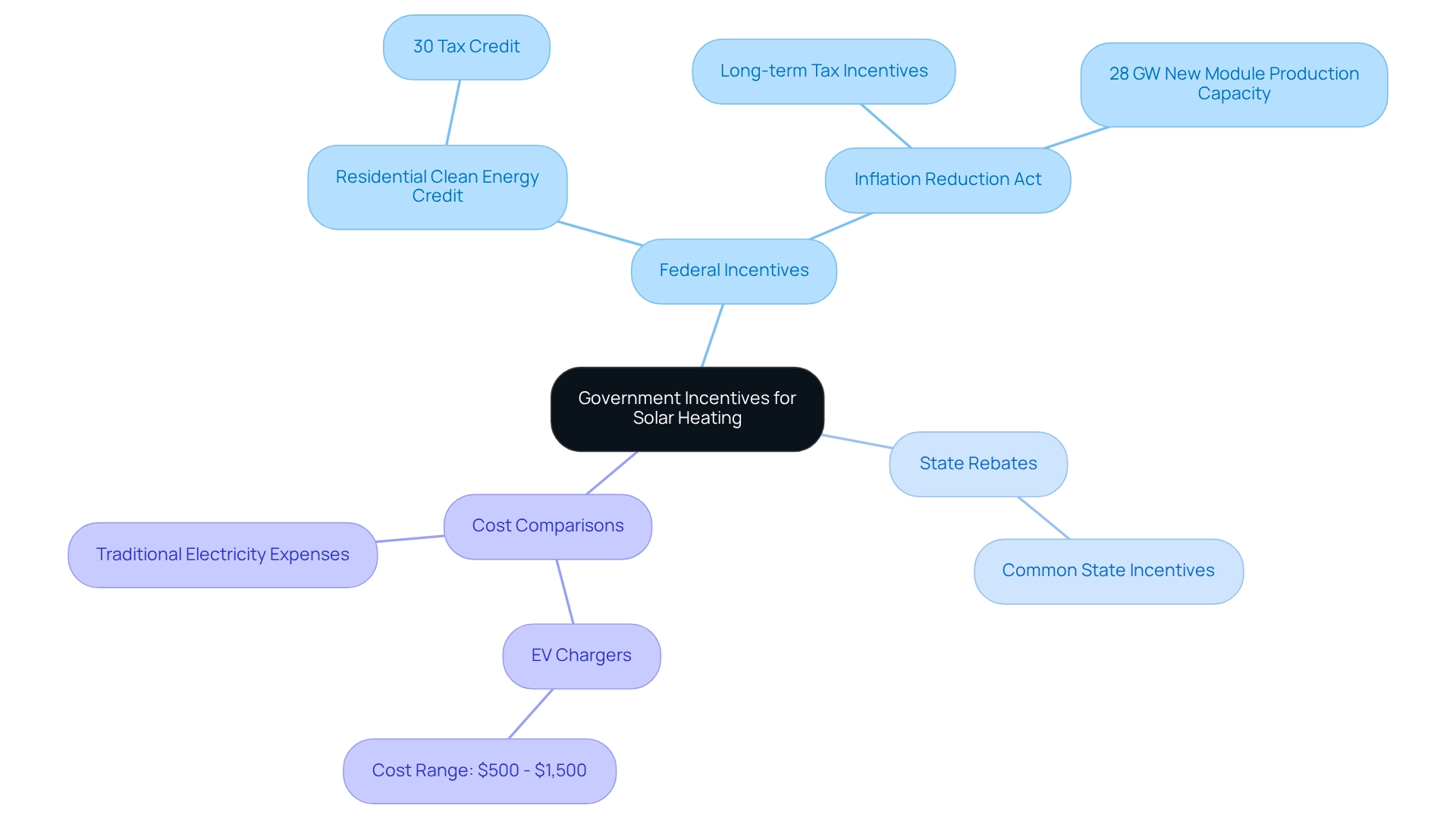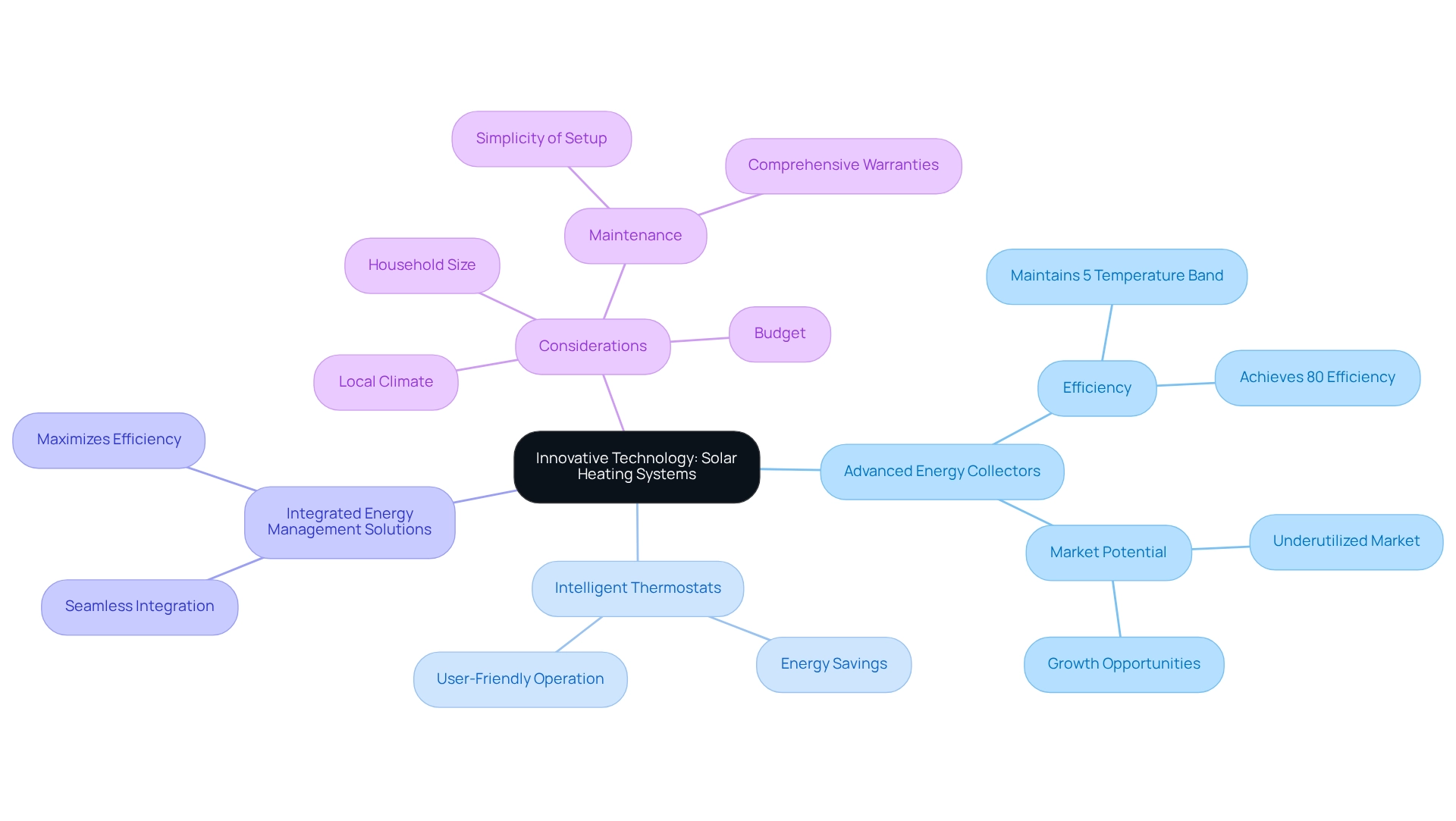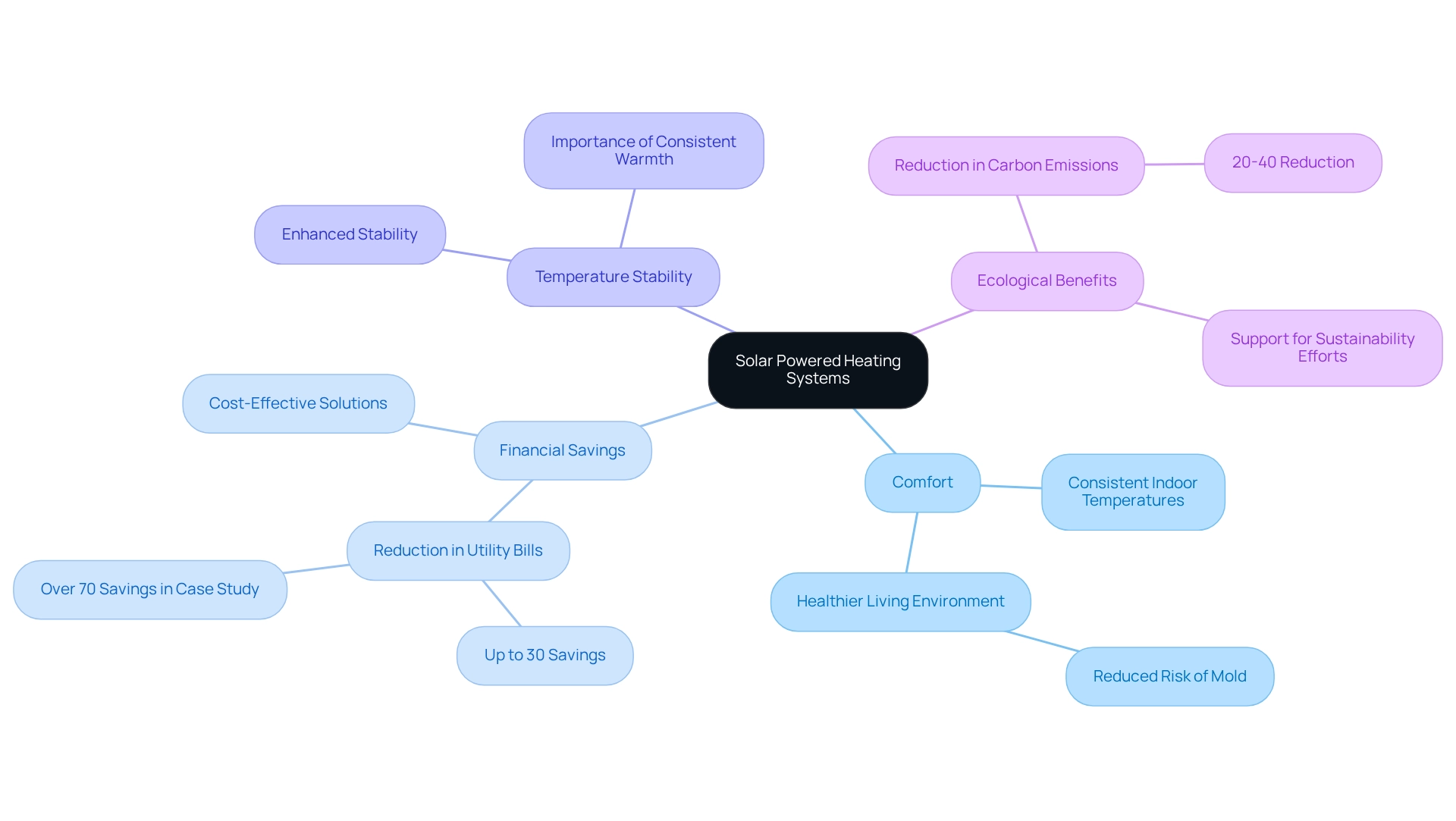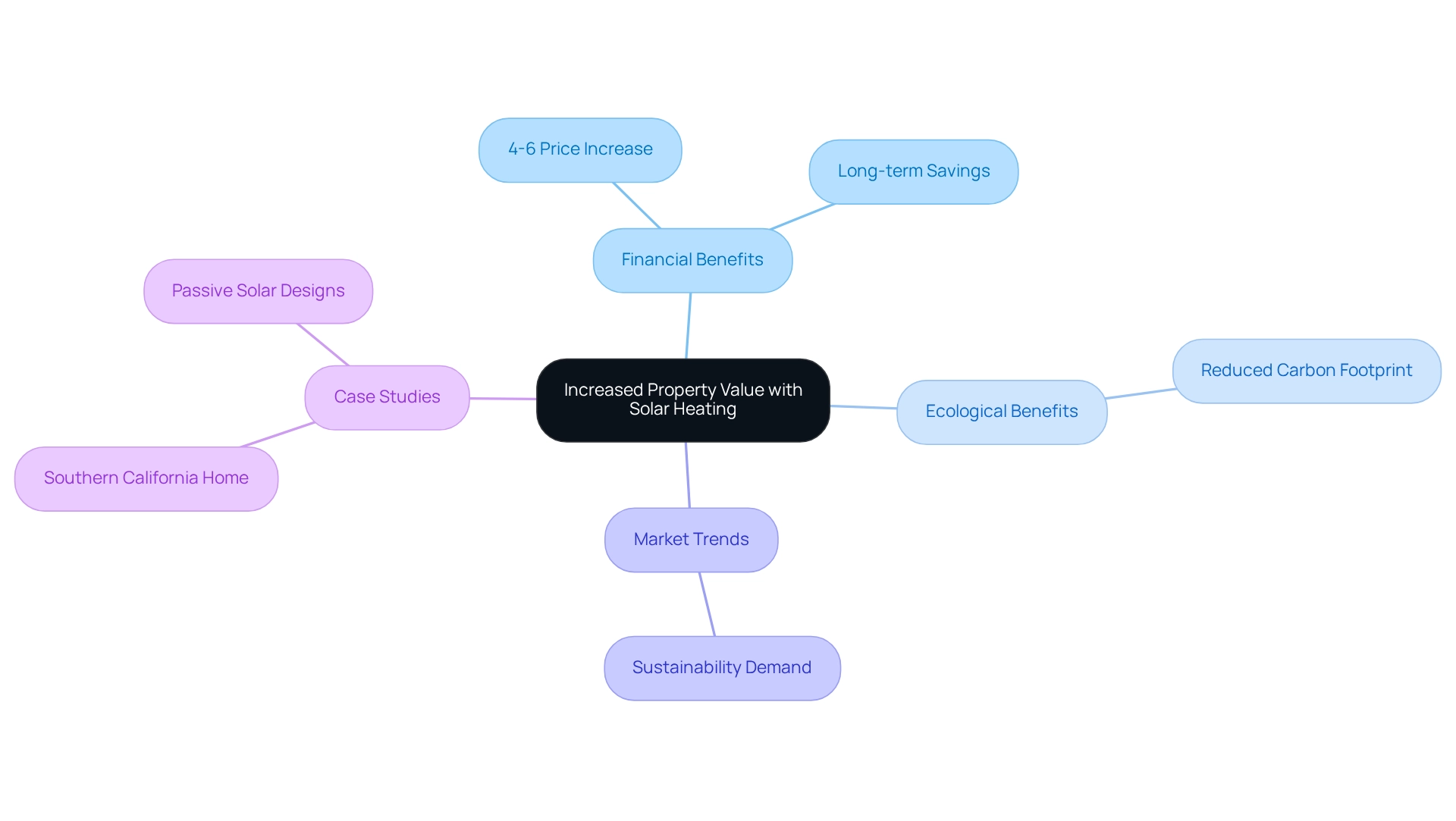Overview
We understand that energy bills can be a significant concern for homeowners, especially those who are eco-conscious. The benefits of solar-powered heating systems extend beyond just cost savings; they also include reduced carbon emissions and increased property value. Imagine achieving substantial savings on your utility bills—some homeowners have reported reductions of over 70%! This not only alleviates financial stress but also contributes positively to our environment by decreasing reliance on fossil fuels.
Additionally, there are government incentives available that can make the transition to solar energy even more accessible. By embracing solar power, you’re not just making a smart financial decision; you’re also taking a meaningful step towards energy independence and a sustainable future. Together, we can create a healthier planet for generations to come.
If you’re curious about how solar energy can transform your home and help you save, let’s work towards finding the right solution for you. Your journey towards a more sustainable and cost-effective lifestyle can start today!
Introduction
In today’s world, where energy costs continue to climb and environmental concerns weigh heavily on our minds, solar-powered heating systems shine as a beacon of hope for homeowners like you who are seeking both savings and sustainability. We understand that managing energy bills can be a source of stress, but by harnessing the sun’s free energy, these innovative systems can reduce heating bills by up to 90%. This offers a financially savvy alternative to traditional fossil fuel methods.
As the urgency for cleaner energy solutions grows, transitioning to solar heating not only promises significant economic benefits but also contributes to a healthier planet for all of us. With numerous case studies showcasing remarkable reductions in energy expenses and a wealth of government incentives available to ease the financial burden, the shift to solar heating has never been more appealing.
Together, let’s explore the myriad advantages of solar heating systems, including their cost-saving potential, environmental impact, and the long-term value they can bring to your home.
Powercore Electric: Cost Savings Through Solar Powered Heating Systems
We understand that rising energy bills can be a significant concern for homeowners, often leading to feelings of frustration and helplessness. Solar-powered devices provide a compassionate solution, offering substantial reductions in energy costs by harnessing the power of free sunlight. Imagine the relief of cutting your energy expenses by up to 90% compared to traditional systems.
For instance, a household that typically spends $200 each month on energy could save over $1,500 annually by transitioning to renewable energy sources. As fossil fuel prices continue to climb, not only provide a more stable and predictable utility expense but also represent a financially wise choice for environmentally conscious homeowners, with numerous case studies highlighting the effectiveness of solar powered heating systems in various residential settings.
For example, a family in Southern California experienced an incredible reduction in their utility costs—over 70%—after installing a solar powered heating system paired with a heat exchanger. This setup not only resulted in significant savings but also supported their sustainability goals by lowering their carbon footprint. It’s heartening to note that a substantial number of property owners enjoy reduced utility costs after implementing these heating solutions, with many reporting savings that facilitate a quicker return on their investment. In fact, studies reveal that more than 70% of homeowners see a decrease in their utility bills following installation.
Through platforms like EnergySage, homeowners can compare quotes and select the best renewable options, leading to enhanced savings and energy efficiency.
Looking ahead to 2025, the financial benefits of renewable resources are further supported by various utility companies and state programs offering rebates. For instance, Oregon provides incentives of up to $5,000 for residential installations. These initiatives not only reduce upfront costs but also encourage the adoption of renewable energy solutions, making them an attractive option for those looking to lower their energy bills while contributing to sustainability.
Moreover, installing photovoltaic panels can increase property value by over $9,000, delivering long-term financial benefits. Additionally, heat pumps represent the latest innovation in clean heating and cooling solutions, further enhancing the efficiency of thermal systems. For homeowners in Stockton, companies like Powercore Electric offer tailored solar solutions designed to maximize these benefits, ensuring that local residents can fully embrace the savings and sustainability that solar energy brings. Together, we can work towards a brighter, more sustainable future.
Reduced Carbon Footprint: Environmental Benefits of Solar Heating
Are you feeling overwhelmed by rising energy bills? Solar powered heating systems can provide a compassionate solution, significantly reducing carbon emissions by replacing traditional fossil fuel usage. The Department of Energy reports that these systems can decrease greenhouse gas emissions by as much as 80%. It’s concerning to note that nearly 40 percent of Americans live in counties with F ratings for ozone smog, according to the American Lung Association. This highlights the urgent need for cleaner power solutions. By utilizing a solar powered heating system, homeowners not only enjoy substantial reductions in but also contribute to a cleaner environment. This shift to solar energy isn’t just a financial decision; it’s a commitment to eco-friendly living and a healthier planet.
Consider the inspiring stories of those who have made the switch. For example, a household in Southern California saw an impressive reduction in utility costs—over 70%—after installing a solar powered heating system. This setup not only provided significant savings but also supported their sustainability efforts by minimizing their carbon footprint through the use of a solar powered heating system. Similarly, passive solar designs have proven effective even in cooler climates. One remarkable case involved a home utilizing large south-facing windows to capture and retain sunlight during winter months, leading to considerable cost savings. According to Clean Energy Resource Teams, a solar powered heating system can reduce a household’s carbon emissions by 20 to 40 percent and cut monthly utility costs by 30 percent. As environmental specialists emphasize, transitioning to renewable power sources is vital for alleviating the negative impacts of fossil fuel usage on our planet.
Powercore Electric, with its local expertise and commitment to quality workmanship, offers tailored energy solutions that maximize savings while minimizing environmental impact. By choosing Powercore, you can equip your home with clean resources that benefit both your finances and the Earth. Moreover, as solar panels near the end of their life cycles, recycling them is becoming increasingly economical and effective, further enhancing the sustainability of solar power solutions. Together, we can work towards a brighter, cleaner future.
Energy Independence: Reliable Heating Solutions with Solar Power
We understand that rising energy bills can be a significant concern for homeowners. Solar powered heating systems provide , offering a shield against market fluctuations. By producing their own heat, homeowners can avoid the unpredictability of power costs, significantly decreasing their dependence on utility providers. This autonomy is especially crucial during power crises or natural disasters, ensuring that homes remain warm and comfortable regardless of external conditions.
With over 30 years of experience supporting the California community, Powercore Electric exemplifies how renewable resources can enhance power autonomy. Case studies, such as ‘Clean Renewable Resources,’ illustrate that utilizing a solar powered heating system not only reduces operating costs but also strengthens homeowners against the fluctuations of conventional power sources. It’s common to feel overwhelmed by the technical aspects of photovoltaic panels, but understanding how they operate is essential for those looking to enhance their power solutions. The integration of a solar powered heating system aids in reducing operating costs and fosters self-sufficiency, making it a vital component of sustainable energy strategies.
Furthermore, government initiatives aimed at improving access to funding for play a crucial role in nurturing the growth of the renewable sector. Homeowners can benefit from exploring available incentives, tax credits, and financing options that significantly lower the initial expenses of renewable energy installations. As more individuals transition to renewable energy options, the impact on utility reliance becomes increasingly evident, paving the way for a sustainable energy future. Together, we can embrace these changes and work towards a brighter, more independent energy landscape.
Long-Term Investment: Financial Returns from Solar Heating Systems
Are you feeling the weight of rising energy bills? Investing in renewable energy solutions is not just about saving money in the short term; it represents a strategic commitment to your financial future. Homeowners can look forward to an impressive return on investment between 10% and 20% each year, with setups typically recovering their expenses within 5 to 10 years. Moreover, renewable energy installations can significantly enhance property values. Studies reveal that homes equipped with these energy solutions sold for an average of 4.1% more than their non-renewable counterparts, translating to an additional $9,274 for the median-valued home.
Consider this: the average cost to install photovoltaic panels is around $19,000, yet this investment can yield about a $10,000 return due to the increased property value. Additionally, federal tax credits, such as the Investment Tax Credit (ITC), allow homeowners to deduct a substantial portion of installation costs from their federal taxes. Local incentives can further ease the financial burden, making renewable energy systems even more appealing.
As Ben Joslin wisely notes, “Purchasing a house with photovoltaic panels already installed is a wise investment.” This blend of savings, , and accessible financial incentives positions renewable energy systems as a compelling choice for your future.
Many case studies illustrate the effectiveness of solar powered heating systems in various homes, showcasing significant reductions in energy expenses and sustainability benefits. For instance, a household in Southern California achieved an astonishing reduction in their utility costs, exceeding 70%, after installing a solar powered heating system along with a heat exchanger. In contrast, a residence in the Pacific Northwest utilized a radiant air warming method, resulting in a 40% decrease in heating costs during the winter months. These examples highlight the diverse applications and substantial savings associated with renewable energy technologies, making them an attractive option for eco-conscious homeowners.
It’s essential to choose reliable contractors for your renewable energy installation, as trust in your service providers is crucial when making such significant investments. Together, we can navigate this journey towards energy independence and sustainability, ensuring a brighter future for you and your family.
Low Maintenance: Hassle-Free Operation of Solar Heating Systems
We understand that concerns about rising energy bills can weigh heavily on homeowners. One of the notable advantages of heating technologies is their exceptionally low upkeep needs. Generally, these setups require little maintenance, mainly consisting of regular assessments and cleaning of photovoltaic panels to ensure peak efficiency. Keeping your solar devices clean is vital for maintaining their efficiency and enhancing power output. Over time, dust, dirt, bird droppings, and other debris can gather on the panels, blocking sunlight and hindering their performance. Routine maintenance is essential to keep your investment working optimally, as even slight performance declines can accumulate over time, leading to a median loss rate of 0.75% per year for photovoltaic systems.
As one expert noted, “Did you notice a significant drop in energy production? This issue can be due to a variety of factors, with the most common being dust and debris buildup. However, it can also be caused by malfunctioning components. The most effective method to ascertain this is via the process of elimination, beginning with cleaning the surface. If that doesn’t fix the issue, it is time to schedule maintenance with professionals.”
Furthermore, researchers from the Indian Institute of Engineering Science and Technology have developed a model to estimate dust accumulation on photovoltaic panels, which is crucial for optimizing maintenance of the surfaces.
Unlike conventional warming methods, which frequently require substantial repairs and extensive maintenance, a solar powered heating system is specifically designed for longevity and effectiveness. This design allows homeowners to experience hassle-free operation for many years, significantly reducing the time and costs associated with maintenance. Recent insights suggest that the operational and maintenance (O&M) expenses for water heating setups typically range from 0.5% to 2% of the initial installation cost each year, depending on the complexity and technology involved. A case study titled ‘Cost Implications of SWH System O&M’ emphasizes that grasping these expenses is essential for homeowners planning for long-term upkeep, as it highlights the financial benefits of thermal energy.
Furthermore, documentation of maintenance activities is essential for tracking system performance and addressing any potential issues proactively, ensuring that homeowners can maintain optimal efficiency. As we progress into 2025, advancements in sunlight absorption technology continue to improve their reliability and ease of use, making them an increasingly appealing choice for eco-conscious homeowners. By dispelling maintenance myths and presenting the facts, it becomes evident that photovoltaic panels are both environmentally friendly and economically advantageous. With a rising focus on sustainability, the shift to like a solar powered heating system not only supports energy autonomy but also aids in creating a cleaner environment. Together, we can work towards a more sustainable future.
Versatile Applications: Integrating Solar Heating with Existing Systems
Are you concerned about rising energy bills? Solar powered heating system solutions offer remarkable versatility, seamlessly integrating with existing heating options like conventional boilers and heat pumps. This compatibility empowers homeowners to enhance the efficiency of their current systems without the burden of a complete overhaul. For instance, consider ; it can significantly improve a traditional water heater, leading to a substantial reduction in power usage and costs while ensuring your comfort remains intact.
Statistics reveal that increasing the number of photovoltaic panels from 12 to 24 can reduce yearly carbon emissions by 700 kg, underscoring the environmental benefits of such integrations. The construction sector plays a crucial role in emissions reduction due to its substantial energy consumption. By embracing a solar powered heating system that harnesses the sun’s power, we can contribute to this vital initiative while enjoying lower utility costs. Numerous case studies highlight that households adopting water heating technologies combined with heat exchangers have seen their utility costs plummet by over 70%. This showcases the significant cost savings and sustainability advantages that await you.
Innovative applications, such as floating installations and carports equipped with panels, are being explored globally, demonstrating the adaptability of heating solutions in various settings. These advancements not only boost capacity but also play a role in mitigating greenhouse gas emissions. As we approach 2025, integrating a solar powered heating system with existing thermal energy technology is poised to become a cornerstone of sustainable residential energy practices. When selecting the ideal heater for your home, it’s essential to consider several key factors:
- Your regional climate
- Household hot water needs
- Budget
- Ease of installation
- The First Hour Rating (FHR)
These elements are vital in ensuring that the chosen system aligns with your specific requirements and maximizes efficiency. Remember, together we can make informed choices that lead to a more sustainable future.
Government Incentives: Financial Support for Solar Heating Adoption
As a homeowner, you may be feeling the weight of rising energy bills and the uncertainty surrounding them. Fortunately, there are ways to significantly reduce your energy expenses through various government incentives designed to support a solar powered heating system. Currently, the federal Residential Clean Energy Credit offers a generous 30% tax credit on installation costs, making the transition to a solar powered heating system more accessible than ever. In addition, many states provide their own rebates and incentives for installing a solar powered heating system, which can further ease the initial investment required for such a change.
The Inflation Reduction Act has not only established long-term tax incentives but has also spurred the growth of domestic renewable energy manufacturing. This has led to an impressive increase of over 28 GW in new module production capacity expected by 2024. This robust support system is vital, especially as the share of renewable energy sources like solar powered heating systems in total U.S. electrical generation has skyrocketed from just 0.1% in 2010 to over 6% today. We understand that navigating these options can feel overwhelming, but targeted regulations are paving the way for a greener and more sustainable power future, underscoring the importance of these incentives.
Moreover, understanding the costs and benefits of electric vehicle (EV) chargers, such as Tesla home chargers, can provide you with additional insights into the financial and ecological advantages of integrating renewable energy solutions into your home. For instance, the average cost of a Level 2 home charger typically ranges from $500 to $1,500, depending on installation and equipment. By comparing these costs with , you can uncover the long-term savings potential.
As Kristin Eberhard, head of policy at Rewiring America, insightfully points out, “But [killing the tax credits] is going to do exactly the opposite.” By staying informed about these financial assistance programs, you can unlock significant savings while contributing to a more sustainable future through a solar powered heating system. Together, let’s explore how these opportunities can work for you and make a positive impact on both your wallet and the environment.
Innovative Technology: Advancements in Solar Heating Systems
We understand that rising energy bills can be a significant concern for homeowners. Recent advancements in technology for solar powered heating systems have made these systems more effective and affordable than ever. Innovations such as advanced energy collectors, intelligent thermostats, and empower you to enhance your energy savings. For instance, the latest integrated thermal collectors maintain a temperature range of only 5% around the maximum temperature, achieving nearly 80% efficiency, particularly during peak sunlight hours.
Choosing the right thermal collection approach requires careful consideration of several important factors. It’s essential to evaluate your local climate and the amount of sunlight your area receives, as these elements directly influence performance. Additionally, assessing your household size and hot water needs is crucial in determining the appropriate capacity. Budget considerations are also vital; while the initial investment may seem substantial, these water heating alternatives can lead to long-term savings by lowering utility costs and reducing reliance on traditional power sources, ultimately contributing to a decrease in greenhouse gas emissions.
Simplicity of setup and maintenance is another important aspect to think about. We encourage homeowners to look for solutions that come with comprehensive warranties and reliable manufacturer support, ensuring lasting satisfaction and peace of mind, particularly when it comes to a solar powered heating system, which, despite its proven effectiveness, currently captures only a small fraction of its market potential. This indicates significant opportunities for growth in both residential and commercial sectors. Increased awareness and acceptance of these innovations could lead to substantial resource conservation and a reduction in greenhouse gas emissions.
By 2025, advancements in thermal technology continue, with countries like Canada, Australia, and Japan leading the market by the end of 2020. These developments not only enhance the performance of energy collectors but also simplify their operation and maintenance, ensuring optimal efficiency and comfort for environmentally conscious homeowners. To take advantage of these advancements, consider investing in intelligent renewable solutions that integrate seamlessly with your existing power networks, maximizing both efficiency and savings. Together, we can work towards a more sustainable future.
Enhanced Comfort: Consistent Heating with Solar Power
Are you concerned about rising energy bills? offers a comforting solution, providing steady and dependable warmth that keeps your home cozy all year round. By harnessing the power of sunlight, the solar powered heating system maintains consistent indoor temperatures, minimizing the fluctuations often seen with traditional heating methods. Homeowners not only enjoy a warm atmosphere but also experience significant savings on utility costs, making this approach a perfect blend of comfort and financial efficiency.
Feedback from users reveals that homes equipped with these technologies frequently enjoy enhanced temperature stability, with many reporting a reduction in utility bills by as much as 30%. This stability not only enhances your comfort but also contributes to a healthier living environment, as consistent temperatures provided by a solar powered heating system can help reduce the risk of mold and other issues tied to temperature swings.
For instance, a family in Southern California saw their utility costs plummet by over 70% after they installed a water heating system alongside a heat exchanger. This setup not only resulted in major savings but also supported their sustainability efforts by lowering their carbon footprint. Moreover, a solar powered heating system can reduce a household’s carbon emissions by 20 to 40 percent, showcasing the economic and ecological benefits of solar thermal technologies.
In addition to active solar thermal systems, passive collection designs have proven effective across various climates. Homes that feature large south-facing windows can capture and retain sunlight during the winter months, significantly cutting down on energy expenses. Experts stress the importance of consistent warmth in achieving a comfortable home.
As we look towards the future of thermal solutions, the ability to provide not just warmth, but a stable and inviting atmosphere, becomes essential. By embracing renewable warmth, homeowners can achieve greater comfort while supporting sustainable practices—together, we can align our heating solutions with eco-friendly living. Let’s take this journey towards energy independence and a more sustainable future.
Increased Property Value: Boosting Home Worth with Solar Heating
We understand that rising energy bills can be a significant concern for homeowners. Installing can greatly increase your property’s market worth and alleviate some of that financial pressure. Research shows that properties fitted with renewable power installations have a selling price that is roughly 4-6% greater than those lacking such installations, based on homes sold from March 1, 2018, to February 28, 2019. This rise is primarily driven by the savings and ecological benefits linked to a solar powered heating system.
For instance, numerous case studies highlight the effectiveness of sunlight-powered heaters in various residential settings. One inspiring example is a home in Southern California that experienced a remarkable reduction in their utility costs, exceeding 70%, after installing a water heating setup paired with a heat exchanger. This setup not only provided significant savings but also contributed to their sustainability efforts by reducing their carbon footprint.
Furthermore, in cooler areas, passive power collection designs have shown effectiveness; one remarkable instance involved a house using large south-facing windows to capture and retain sunlight during winter, significantly lowering utility costs. As the demand for energy-efficient residences grows, possessing a solar powered heating system enhances a property’s attraction and places it advantageously in .
Margo McDonnell, president and CEO, emphasizes that grasping the advantages of renewable energy installations offers a competitive edge in the marketplace. This trend highlights the significance of renewable energy solutions in enhancing property values, especially as more homeowners prioritize sustainability in their buying choices.
To increase the worth of your residence, consider investing in a solar powered heating system, as it not only aids in ecological sustainability but also boosts your property’s appeal in the market. While the cost of installing a solar powered heating system can vary, the long-term savings on energy bills often outweigh the initial investment, making it a financially sound choice. Together, we can work towards a more sustainable future that benefits both you and the environment.
Conclusion
As homeowners, we often find ourselves grappling with rising energy bills, and it’s only natural to seek solutions that alleviate this burden. Solar-powered heating systems present an unparalleled opportunity to not only achieve substantial cost savings but also embrace a sustainable lifestyle. By harnessing the power of free solar energy, these systems can reduce heating costs by up to 90%. This makes them not only an economically wise choice but also a vital step toward nurturing a healthier planet. With numerous case studies showcasing significant decreases in energy expenses and a wealth of government incentives available, transitioning to solar heating is more accessible than ever.
We understand that the financial advantages are compelling, but the benefits extend far beyond just savings. Solar heating systems play a crucial role in reducing carbon emissions, contributing to a cleaner environment for all of us. The ability to generate energy independently shields homeowners from the volatility of fossil fuel prices, ensuring reliable heating regardless of market fluctuations. As the demand for renewable energy solutions continues to grow, investing in solar heating not only enhances property value but also aligns with the global shift toward sustainable practices.
Moreover, the low maintenance requirements and innovative technology associated with modern solar heating systems further enhance their appeal. Imagine enjoying consistent comfort, reduced energy bills, and increased property values with minimal upkeep. As we move toward a more sustainable future, embracing solar heating systems is not just a smart financial decision; it is a commitment to a cleaner, more resilient world. By investing in solar heating today, we pave the way for a brighter tomorrow, both for ourselves and for the planet as a whole. Together, let’s take this important step towards a more sustainable future.


